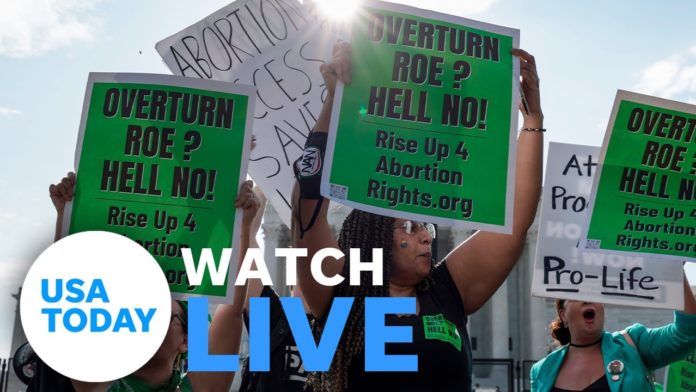Friday’s landmark decision to overturn Roe v. Wade drew swift, emotional reactions all across the country.
Trigger laws put in place before the ruling meant that abortion was effectively outlawed in 13 states as soon as the decision was released Friday morning.
Some members of Congress plotted their next moves, including House Majority Whip Jim Clyburn, D-S.C, who expressed optimism that Democrats can mount a legislative response to the Dobbs decision.
And many more were concerned about what the Supreme Court ruling could mean for other milestone decisions, particularly after conservative Justice Clarence Thomas called for the Supreme Court to ‘reconsider’ gay marriage and contraception after the Roe ruling.
Here’s a look at what the ruling means for Americans and how the nation is responding to a fundamental change in reproductive rights.
Is birth control banned? Here’s what to know after Roe v. Wade overturned
With this decision, abortion will likely be banned or greatly restricted in at least 22 states, according to the Guttmacher Institute. Some experts worry these bans could trickle down to restrict the use of emergency contraception and birth control.
“The rhetoric has been really increasing over the last several years,” Mara Gandal-Power, director of birth control access at the National Women’s Law Center, said before the ruling. “There’s definitely a domino effect which I think people are really starting to wake up to.”
Health experts say what’s partly driving this legislation is the misconception that emergency contraceptives are able to terminate a pregnancy.
“The medications don’t work to abort a pregnancy,” said Dr. Mary Jacobson, an OB-GYN and chief medical officer at Alpha Medical, a telemedicine site for women’s health and sex differences. “If the patient were pregnant and took Plan B it doesn’t increase abortion and it doesn’t have any effects on the ongoing pregnancy.”
Can you still buy Plan B?:What to know after SCOTUS overturns Roe v. Wade
Roe v. Wade birth control:What to know about birth control as Supreme Court overturns Roe v. Wade
Thomas calls for SCOTUS to ‘reconsider’ gay marriage, contraception
Associate Justice Clarence Thomas on Friday said the Supreme Court should “reconsider” other rights established by the high court in the wake of its decision to overturn Roe v. Wade, including access to contraception and gay marriage.
Thomas’ concurring opinion – which no other member of the court joined – tracks with an argument abortion rights groups had made for months leading up to the court’s blockbuster abortion decision: A ruling that the Constitution doesn’t protect a right to an abortion would jeopardize other rights the court established under the 14th Amendment.
“In future cases, we should reconsider all of this court’s substantive due process precedents, including Griswold, Lawrence, and Obergefell,” Thomas wrote, referring to landmark opinions that blocked states from banning contraception, sex by same-sex couples and gay marriage. “After overruling these demonstrably erroneous decisions, the question would remain whether other constitutional provisions guarantee the myriad rights that our substantive due process cases have generated.”
Clarence Thomas:Thomas calls for SCOTUS to ‘reconsider’ gay marriage, contraception after Roe v. Wade
President Biden gives speech on Roe v. Wade ruling
President Joe Biden said Friday that the Supreme Court’s decision to overturn Roe puts women in danger in America.
“Now with Roe gone, let’s be very clear. The health and life of women in this nation are now at risk,” Biden said in a Friday afternoon speech.
—Francesca Chambers
Politicians respond:Biden calls SCOTUS abortion ruling ‘a very solemn moment’; what he and others are saying
Trump praises abortion decision by his appointed Supreme Court justices
Former President Donald Trump, who nominated three members of the Supreme Court majority that struck down Roe v. Wade, praised the decision that ended the constitutional right to an abortion.
In an interview with Fox News Digital, Trump said the decision re-establishes the rights of states to restrict or ban abortions.
“This brings everything back to the states where it has always belonged,” Trump said.
Trump also said the decision “is following the Constitution, and giving rights back when they should have been given long ago.”
As for supporters who favor abortion rights, Trump told FoxNews.com: “I think, in the end, this is something that will work out for everybody.”
—David Jackson
Politicians respond:What Bernie Sanders, Susan Collins and other politicians others are saying
McConnell: Abortion ruling result of a half-century struggle by conservatives
Senate Republican Leader Mitch McConnell praised the U.S. Supreme Court’s 6-3 decision on Friday, saying it represents a half century of struggle by conservative activists.
“The Supreme Court’s landmark ruling in Dobbs is courageous and correct,” he said. “This is an historic victory for the Constitution and for the most vulnerable in our society.”
During Donald Trump’s single term as president, McConnell was pivotal in reshaping the judiciary. He shepherded dozens of conservative judges onto the bench, including three high court nominees—Neil Gorsuch, Brett Kavanaugh, and Amy Coney Barrett—that tilted the Supreme Court to its current conservative majority.
In May, the GOP leader acknowledged in an exclusive interview with USA TODAY that a national abortion ban is “possible” in Congress.
“If the leaked opinion became the final opinion, legislative bodies – not only at the state level, but at the federal level – certainly could legislate in that area,” McConnell said.
“And if this were the final decision, that was the point that it should be resolved one way or another in the legislative process. So yeah, it’s possible. It would depend on where the votes were.”
—Phillip M. Bailey
Obergefell: Thomas ‘imposing twisted sense of morality’ on the country
In an interview Friday, the plaintiff whose name is on the case legalizing same-sex marriage said abortion ruling is a call to opponents of marriage equality “to now start their engines and to come after those rights.”
“This very clearly paints a target on our right to privacy, our right to commit to the person we love and to form our families,” said Jim Obergefell, an Ohio resident and gay-rights advocate.
Obergefell and John Arthur, who was gravely ill, traveled to Maryland in July 2013 to get married because Ohio didn’t allow same-sex unions. Arthur died three months later, and Obergefell sued to be listed on the death certificate as Arthur’s husband. Their case was among multiple cases involving dozens of plaintiffs argued before the Supreme Court.
The 2015 decision establishing the right for same-sex couples to marry was a milestone for LGBTQ rights in the United States. Thomas dissented against the majority opinion.
Obergefell accused Thomas of “imposing his twisted sense of morality” on the country. He said he’s scared about what the future may hold but urged women, LGBTQ people and their allies to keep fighting for their rights.
The future of gay marriage:Jim Obergefell says Supreme Court abortion ruling puts target on privacy, gay marriage
Americans divided as they react to Supreme Court overturning Roe
Moments after the Supreme Court ruled Americans no longer have a constitutional right to abortion, staff at Hope Clinic For Women in southern Illinois called an emergency meeting.
“When I saw the decision, my heart dropped below my stomach,” said Hannah Dismer, education and research coordinator at the clinic in Granite City, Illinois, about 10 minutes from Missouri, where nearly all abortions are now illegal.
“I thought I was going to throw up. But I didn’t. I knew this was gonna happen,” Dismer told USA TODAY. “We have patients in front of us, and we have to continue working like this isn’t happening, even when it is.”
Elsewhere, anti-abortion rights activists celebrated the decision they eagerly anticipated. Kristan Hawkins, president of Students for Life, said, “Now we get back to building up a healthy society, affirming life for women and their children, born and preborn.”
‘New era’ or ‘dark day’?:Americans divided as they react to Supreme Court overturning Roe.
What’s next? These states may be pivotal for post-Roe abortion access.
Florida is among several states, including Kansas and North Carolina, whose decisions on whether to continue to offer abortions will be especially pivotal to post-Roe abortion access in the United States, experts and advocates said.
The Supreme Court’s decision to strip away federal abortion rights means 26 states – many in the South and Midwest – are certain or likely to enact bans, according to Guttmacher. Others, including on the West Coast and Northeast, are expected to retain access.
But some states that expect surges in demand — and are considered key to access as nearby states enact bans — also face uncertainty because of upcoming ballot measures, hostile legislatures or midterm elections that could oust abortion-rights governors protecting access in states such as Wisconsin, Michigan and Pennsylvania.
After Roe v. Wade overturned:What’s next? These states could be pivotal for post-Roe abortion access.
What does the Supreme Court decision to overturn Roe v. Wade mean?
The Supreme Court ruled Friday the Constitution provided no right to abortion, overturning nearly 50 years of precedent and sending the legality of the procedure to state legislatures to determine.
The most hotly awaited decision of the term sparked a firestorm of reaction. Republicans celebrated after having fought for decades to overturn Roe v. Wade, the landmark 1973 decision that established a constitutional right to abortion. Democrats lamented their lost fight to save it. Officials on each side said the decision would spur voting in the fall elections.
Access to abortion could become a patchwork based on where a person lives. In anticipation of the ruling, 26 states are certain or likely to ban abortion, according to a study by the Guttmacher Institute, a research group that supports abortion rights.
What does overturning Roe mean?:What we know about the Supreme Court’s abortion ruling.
Supreme Court’s Roe v. Wade ruling sparks concerns over abortion rights, data privacy
The decision could push states to make abortions illegal. Last year, Texas signed one of the most restrictive abortion laws in the country, banning them after six weeks of pregnancy. The law also allows anyone to sue any other person who performs the procedure or helps people get an abortion.
Some experts fear that those who seek abortions could be outed by tech companies to governments or law enforcement by handing over the troves of personal data they maintain upon request.
“With unintended consequences here, we’re really looking at a situation where tech companies’ very loose restrictions around collecting data and users’ data privacy is really going to put people who are seeking abortions, or even seeking to learn more about abortions, at risk,” said Mariana Ruiz Firmat, executive director at nonprofit organization Kairos.
Privacy rights after Roe ruling:Supreme Court’s Roe v. Wade ruling sparks concerns over abortion rights, data privacy








